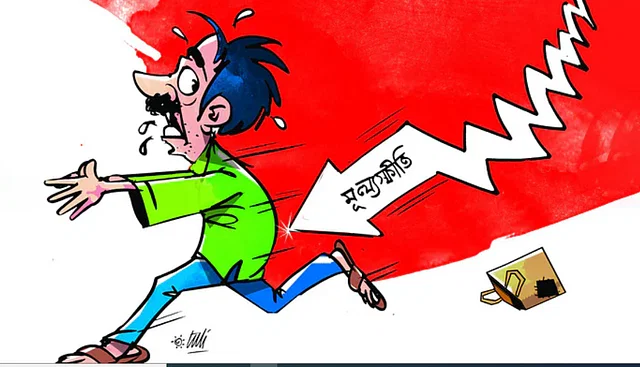US inflation averaged 8 percent in 2022, the highest in 40 years. This inflation could have increased further. But the US central banking system has aggressively raised policy interest rates, with the Federal Reserve (Fed) considering inflation as the economy’s No. 1 enemy. As a result, inflation came down towards the end of the year. While this has slowed economic growth, investment has declined. And there is a danger of recession in the economy.
According to the International Monetary Fund (IMF), the average growth of the world economy (gross domestic product or GDP) will fall to 2.7 percent in 2023. If the situation worsens, it may go below 2 percent. But such is the situation, the global economy is now prepared to tolerate some recession, but inflation will not be tolerated at all. In the 1980s, the United States emerged from a decade of hyperinflation along this path.
But the policy of Bangladesh is exactly the opposite. It is not inflation control, but all arrangements are being made to raise it. And this work is done by the government itself. The latest example is the increase in electricity and gas prices. It was also done by the executive order of the government, hastily. Earlier, the price of fuel increased. These are the main main tools to increase inflation another round.
In August last year, the government suddenly hiked fuel prices from 42 to 51 percent. As a result of this, the country’s inflation which was 7.48 percent in July, increased to 9.10 percent in September. The Bangladesh Bureau of Statistics (BBS) did not hide the information about the increase in inflation. It took them two months to find a way to publish growth data. Since then, however, the BBS has been taking various measures to reduce inflation by some magic. Although reduced very little.
For example, the Ministry of Planning has presented a report on the economic situation of the country in the meeting of Ecnec on January 17. It said, ‘As we all know, the Russia-Ukraine war has created instability in global markets, leading to high inflation around the world and in our country, among other things. But we seem to have handled this fluctuation well. Inflation, a key indicator of the macro economy, declined to 8.71% in December from 8.85% in November. The downward trend of inflation for five consecutive months since August last year is particularly noticeable.
Inflation was 9.10 percent. From there it has decreased by 8.71 percent. Decreased by only 39 percentage points. That is why, according to the official commentary, Bangladesh has “well handled” the pressure of inflation. But the United States at the same time reduced inflation from about 9 percent (compared to the same period of the previous year) to 6 and a half percent, saying that the crisis is not over. So they will maintain an aggressive attitude to reduce inflation.
Now the question is, how long this huge success of reducing inflation for five consecutive months can be sustained. Because, on January 12, the price of electricity was increased by 5 percent. And on January 18, the price of gas increased to a record amount. The price of electricity used especially in the industrial sector has been increased from 88 to 178 percent. This will have a major impact on the industrial sector, on production costs. If the cost of production increases, it will affect the cost of production. A rise in commodity prices means renewed inflationary pressure. So it can be assumed that another pressure is coming on the lifestyle of people with limited income.
2022-23 fiscal year is about 6 months left. The government’s inflation target at this time is 6.5 percent. On the other hand, last October, the IMF also estimated that in 2023 the average price inflation in the world will decrease from 8.8 percent of the previous year to 6 and a half percent, and in 2024 it will further decrease to 4.1 percent. But the way the government is increasing the price of electricity, oil and gas, whether this target can be achieved in reality is the big question now. Or it could be that, even as the cost of living actually rises, the BBS will just magically keep inflation down.
Finally, on January 15, Bangladesh Bank announced the new monetary policy for the new year. A slight increase in the policy interest rate or repo rate there will not have any impact on industrial loans. Because, the interest rate has been kept at 9 percent as before. The currency supply target has also been increased. Again, if the government wants to maintain the money supply by printing money due to the decrease in deposits, inflation will also increase. So it can be said that the government is keeping all the arrangements to increase inflation one after the other.










More Stories
Who are in the race to succeed Jacinda
People will remember Sarah Islam, the first organ donor
Capture warrant against DB ADC Shahadat in spouse torment case